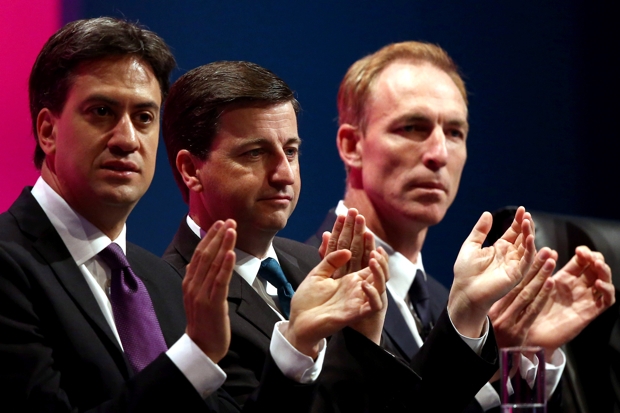Ed Miliband’s party has ended up having a reasonably good week, even though it’s been a pretty tough battle.
Today’s front pages have not been good at all, something the party leader’s supporters are obviously disappointed by, but given the story about a comparison between the row about Lord Fink’s tax affairs and the hacking of Milly Dowler’s phone was made by an aide, not Miliband, and then reported in a way that was initially misinterpreted, the focus of the row is not Miliband himself. The line about Miliband’s own tax affairs was inevitable, too. But it depends whether anyone can find anything to continue the story.
The Conservatives have also been rather rent-a-quote-y on the reference to Milly Dowler, which is regretful: the papers would have picked up the comparison without a quote from Tory MP Mark Garnier, for instance. In some instances it is better to let a row rumble on in the press without getting involved as a party (or at least without appearing to get involved: often parties push stories from behind the scenes with the condition that no fingerprints appear on the copy leading anyone to conclude it was definitely briefed by them), lest anyone suspect you of milking the row for political gain.
But beyond that, here are three reasons why this week has gone well for Labour.
1. Miliband had a row about tax avoidance
Part of this row was a continuation of last week’s row about business leaders who avoid paying taxes trying to talk about the danger that Labour posed to Britain. That row hadn’t gone all that well because of a number of strategic weaknesses, including a failure to wheel out business leaders who support Labour’s policies. This week the founder of green energy firm Ecotricity announced he was donating £250,000 to Labour. The party was jolly pleased, but must have wished that he’d made the donation just a few days earlier.
But the other part of this row was just good luck for Miliband, with the publication of the HSBC files by the Guardian and BBC’s Panorama. It enabled him to talk about tax avoidance and ‘dodgy donors’. Set against the backdrop of the Tory Black and White Ball this week, Miliband’s attack worked well, and the Tories ended up having to defend donors, which whether or not it is right does not look great to many voters, who polling shows want parties to stand up to big business. Labour has launched this poster at the end of the week to keep the tax avoidance theme going, and Miliband plans to talk about it over the weekend, too.

2. Miliband stood up to a powerful person and won
This was probably one of the riskier David vs Goliath moments for the Labour leader. Standing up to Murdoch was a big fight, but repeating allegations you’ve made under privilege in public after the threat of legal action was a big, big risk. It’s not clear whether Miliband made the right call on the basis of the facts available to him when he walked into PMQs on Wednesday, but in the end, he got lucky again as Lord Fink decided to step back from his threat in a surprise interview with the Evening Standard. Miliband was a few minutes away from giving his speech in which he was due to repeat the allegations when the news came through that Fink would only sue if he called him ‘dodgy’. Given Miliband hadn’t called Fink ‘dodgy’ in the Commons on Wednesday – he’d only offered a general description of Tory donors as ‘dodgy’ – he could repeat the criticisms without fear. He had won.
That he’d won was underlined by how quickly Tory spinners were out and about calling this a ‘massive climbdown’. When spinners are trying to tell journalists how they think something has gone, it’s generally because the reality has been quite different.
3. Labour has a campaign reaching a group of uncertain voters.
Yes, the pink van/bus/Harmanmobile was patronising and the idea of a ‘women’s campaign’ a bit odd, but the purpose of the campaign that Harriet Harman and Gloria de Piero launched this week was for Labour to reach the 9.1 million women who did not vote in the last General Election.
The national debate has been about the bus, but some of the MPs on that bus, particularly de Piero, will be very useful messengers to those voters. De Piero has spent the past few years working with non-voters and working out why people are cynical about politics. As GMTV’s former political correspondent, she speaks human and is less interested in the group of very engaged voters who listen to the Today programme and pore over the newspapers than she is in swing voters who watch breakfast news and who aren’t even sure whether they will make it to the polling station. Even if the conversation on Newsnight was about whether or not Harriet Harman should have settled for a patronising pink bus, the conversations that people like De Piero have when on tour in the next few weeks could be much more powerful. And if this is a general election made up of 650 by-elections, that is rather important.
Now, these positives are all rather qualified. When the party does win, it tends to do so in a rather messy way, or in spite of itself. As I point out above, there has been rather a lot of luck involved, too. All that said, this week certainly doesn’t change the fundamentals. Old suspicions have been confirmed, rather than voters learning anything new about the two parties. That seems to be the way both want to play the election unless one of them can find something that changes the game.







Comments